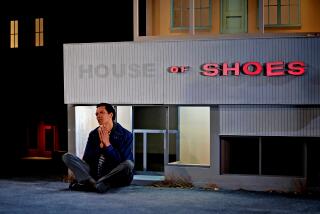Winning the ‘Lesbian Lotto’ : LOVE, ZENA BETH, <i> By Diane Salvatore (Naiad Press: $18.95; 224 pp.)</i>
- Share via
Diane Salvatore’s new novel, “Love, Zena Beth,” has lesbians all over the country playing the celebrity guessing game of identifying the real-life models for her characters: Is it Rita Mae Brown? Is it Martina Navratilova? Who is the closeted female network news anchor? Yet beyond that guessing game, “Love, Zena Beth” is a highly entertaining novel that takes us to places not generally associated with lesbian culture, such as Zena Beth’s dazzling 40th birthday party at the 21 Club, with every famous and infamous lesbian and gay man in attendance.
Salvatore has a great eye for detail as she describes the journey of cub reporter Joyce Ecco, who works for Hip, an alternative downtown weekly newspaper in New York City. Joyce is given the assignment of interviewing the world’s most celebrated and notorious lesbian writer, Zena Beth Frazer. The interview takes place during one of Zena Beth’s speaking tours, in her hotel room overlooking Central Park, which leads to some great sex scenes and lots of room service.
Zena Beth is as famous for her pioneering vision as she is for her sensational love affair with world-renowned sports star Helena Zoe (skiing, not tennis). But Helena left Zena Beth, and Zena Beth cannot quite get over it. She also has a terrible fear of being alone, and her fame and fortune isolates her even further.
Zena Beth is 17 years older than Joyce Ecco, and it is only in retrospect that Joyce understands that, among the famous, “those who were gay, because they were isolated and conspicuous all at once,” were “limited in avenues of meeting lovers, except for those few who were trapped in the same fishbowl,” or, as in the case of Joyce Ecco, wandered into it. Joyce’s attraction to Zena Beth is not purely idol worship or sexual. “The real lure, I think now,” says Joyce, “is that I saw her as my rendezvous with immortality; in some subterranean way I believed that if I breathed the same rarefied air as she did, if I rubbed against the secret elixir of her skin, then I would be somehow more worthy, more worthwhile, myself. In some ways I did not fully exist yet in my own imagination.”
When she becomes Zena Beth’s lover, Joyce is seen by her close friend and confidante, Nikki, as having won the “Lesbian Lotto.” And indeed, Zena Beth is aware of her status and allure as a celebrity. Her day-to-day world, which is not necessarily in a state of constant enchantment, including as it does trips to the supermarket, is unimaginable to those outside the magic circle. When Zena Beth casually refers to Helena for the first time, Joyce is thrown off balance, as if Helena Zoe “were the girl next door or someone she’d picked up at the K-Mart, instead of one of the most famous sport faces in the modern world.”
Joyce’s fantasy comes true when Zena Beth invites her to live with her in the Smoky Mountains. Joyce, the born-and-bred New Yorker, packs up everything, including her career, and moves south to the country town of Mountville. She is in the passenger seat as they drive through the idyllic countryside in, of course, Zena Beth’s white Jaguar.
As they approach the house for the first time, Zena Beth, her eyes on the road, casually mentions that Joyce will be the first person in her home since Helena. When she tosses out the remark, “I do still hope we might get back together someday,” Joyce is “scarlet with anger and humiliation.” Zena Beth continues, as if Joyce were just a friend, “It’s scary, when all is said and done, to love a woman that much. I never want to do it again.”
While Zena Beth is on one of her many speaking tours, Joyce experiences exile, as if her life is going on without her, and so lands a job at the local newspaper, the Town Crier. Zena Beth’s warning, “There’s no dyke more dangerous than a closeted dyke,” comes true when a local politician, Louise Fleck, launches a “loud and spirited attack” against a gay-rights bill. Louise, it seems, is a habitue of the local gay restaurant, the Swamp Side, where she meets and beds women as closeted as she is. Joyce is confronted with the dilemma of “outing”: If she is silent, Fleck will rise to political power with a conservative, anti-gay base. If she exposes her, she is essentially doing the same thing as the right wing: Using someone’s homosexuality as a weapon of destruction.
Ultimately, “Love, Zena Beth” is a book about relationships and self-knowledge. “There are no great thunderclaps of revelation, no mornings when you wake up and find all your answers on your lap like breakfast brought to you in bed. Most of the time, we discover that our decisions have been made several weeks or even years before we have the courage to face them; it only remains, then, to find a way to rationalize them.”
“Love, Zena Beth”--a Book-of-the-Month Club and Quality Paperback dual selection--is a book about power, sex, relationships and fame, written with humor and honesty.
More to Read
Sign up for our Book Club newsletter
Get the latest news, events and more from the Los Angeles Times Book Club, and help us get L.A. reading and talking.
You may occasionally receive promotional content from the Los Angeles Times.








